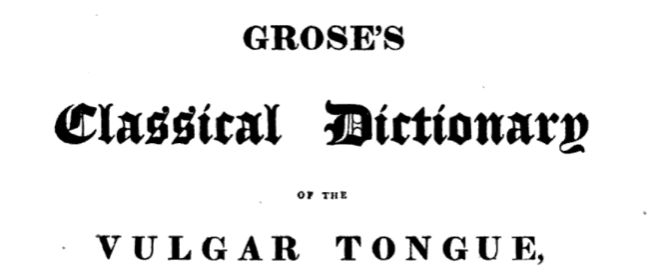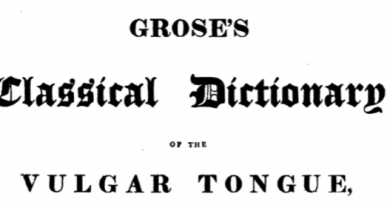Dictionary of the Vulgar Tongue – Day 138
The Dictionary of the Vulgar Tongue was first published at the end of the eighteenth century, and given that the current health crisis is giving too much time to read books, I thought I’d pick a daily word from it until I got bored….
Garret Election
This was an event very much of its time, popular in the middle of the eighteenth century, but falling out of favour by the beginning of the nineteenth century. It was defined by the dictionary as:
“A ludicrous ceremony, practiced every new parliament: it consists of a mock election of two members to represent the borough of Garret (a few straggling cottages, near Wandsworth, in Surry [sic]); the qualification of a voter is, having enjoyed a woman in the open air within that district: the candidates are commonly fellows of low humour, who dress themselves up in a ridiculous manner. As this brings a prodigious concourse of people to Wandsworth, the publicans of that place jointly contribute to the expense, which is sometimes considerable.”
Francis Grose, not for the first time, made a spelling error in the dictionary, as it should really be a ‘Garrat election’ as it takes its name from the village of Garrat, in Wandsworth, London. Evidence of this area is still evident in Wandsworth, not least with the Garratt Tavern and Garratt Lane.
The whole thing came about when there was a real election to elect an individual to preside over the town’s small commons area. It seems some people took this a little too seriously, so others decided to mock that process with their own election. This evolved into an election that wasn’t taken at all seriously and was designed to elect an idiot. Perhaps there are modern elections that still do that, but I won’t verge into politics here.
These mock elections caused much merriment and I can imagine the entire disappointment that must have been felt by the serious local politicians in the area. There were numerous candidates for this fake post, in one year there were nine, with various random promises being made to the electors. The Globe newspaper noted that one individual elected was Sir John Dunstan, although the knighthood was fake, who “had at his command a great fund of vulgar wit, and was of an extremely grotesque and peculiar appearance”.
For a while, these elections drew thousands of people out from the centre of London to watch proceedings, which were likely drunken affairs. This is perhaps evident by the fact that inn-keepers paid some of the costs of the event, although the popularity started to wane and later attempts in the 1830s to revive the tradition failed.


